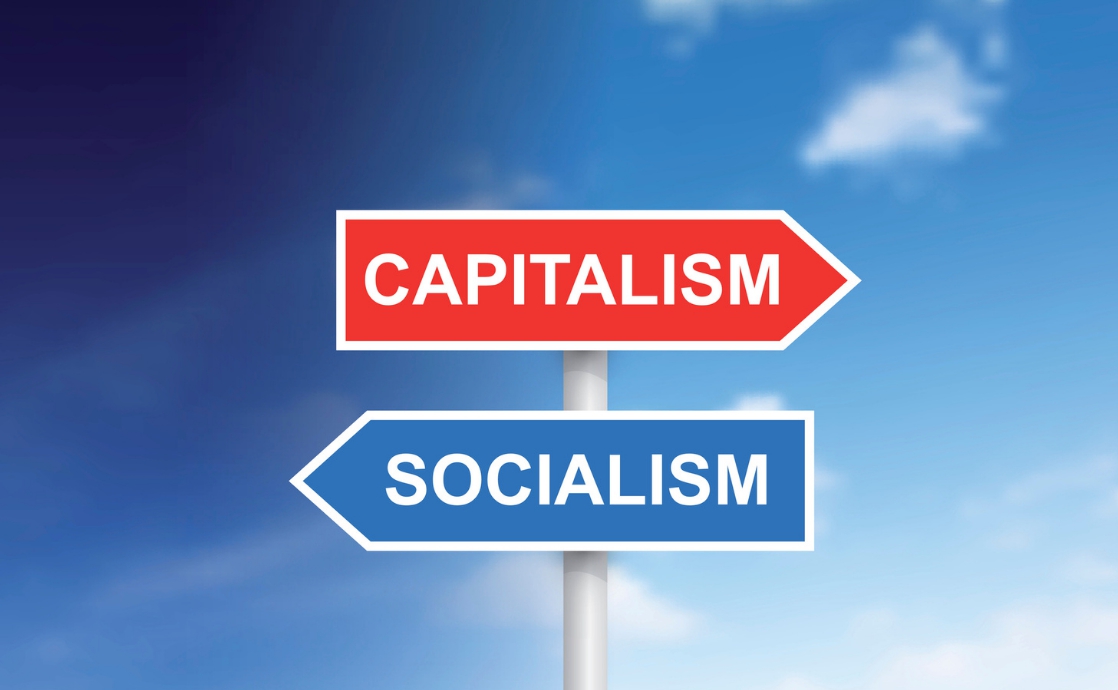The views expressed in our content reflect individual perspectives and do not represent the authoritative views of the Baha'i Faith.
Lately, I’ve been surprised at our culture’s heated discussions over socialism and capitalism. Mostly, the arguments seem politically motivated – so let’s try to get past the political spin to the actual facts.
At the outset, I should mention that, as a Baha’i, I do not take part in or interfere with partisan politics. From a Baha’i perspective, which emphasizes the unity of humanity, it bothers me to see that many valid and beneficial elements of these two economic systems have been ignored, due mostly to differing political views.
RELATED: Three False Gods: Nationalism, Racialism, Communism
As an economist, I see some good in each system. As a Baha’i, I would love to see humanity combine the best elements of socialism and capitalism in the interests of re-adjusting the world’s economic systems, as Abdu’l-Baha, the son and successor of Baha’u’llah, the founder of the Baha’i Faith, suggested:
The readjustment of the economic laws for the livelihood of man must be effected in order that all humanity may live in the greatest happiness according to their respective degrees.
In my opinion, a combination of the two would provide a workable solution for a healthy economic system where individual freedom is respected, and at the same time, social issues such as poverty are approached more effectively.
Socialism and Capitalism: the Conventional Wisdom
Here’s the conventional wisdom: from a capitalist point of view, socialism is evil and against the spirit of human rights, suffocating individual initiative and freedom. Those who support socialism, on the other hand, blame corruption, extreme wealth, and greed, as the products of capitalism and their root cause, for much of human suffering.
The truth must sit somewhere in the middle of those polarized viewpoints, since no ideology or concept is without its merits. So let’s examine the two ideologies in a different way: by looking at their benefits.
For those who don’t fully understand what capitalism and socialism stand for, very briefly and in a simple way without getting technical, I’ll attempt to explain these two systems by drawing attention to their main features. Hopefully, by throwing a little light on these concepts, we can all be in a better position to judge them without depending on the misinformation supplied by opposite parties.
Socialism
Simply put, socialism is a populist economic and political system based on public ownership, like collective or shared ownership of the means of production. Socialists believe that shared ownership of resources and central planning provides an equitable distribution of goods and services and a more equal society. Governments’ role and control of the system’s workings is a vital feature of the socialistic pattern of an economic system.
The Baha’i writings support the idea and importance of socialism – if done in a democratic way and in a voluntary spirit, without involuntary wealth redistribution, force, or compulsion. History shows that the use of force achieved some socialist ideals of equality, but at the cost of individual rights. Abdu’l-Baha, in a speech he gave in the United States in 1912, explained:
The question of socialization is very important. It will not be solved by strikes for wages …In the Bolshevistic principles equality is effected through force. The masses who are opposed to the people of rank and to the wealthy class desire to partake of their advantages.
But in the divine teachings equality is brought about through a ready willingness to share. It is commanded as regards wealth that the rich among the people, and the aristocrats should, by their own free will and for the sake of their own happiness, concern themselves with and care for the poor. This equality is the result of the lofty characteristics and noble attributes of mankind.
Socialism puts great emphasis on social programs and services for society’s poorest people. The original teachings of most religions encourage some form of socialism.
Capitalism
In the simplest terms, capitalism is an economic system in which private individuals own and control property according to their interests. Demand and supply freely set prices in capitalist markets, in a way presumed to serve the best interests of society. The main feature of capitalism is self-interest, which impels each person to make a profit. In that system, governments are expected not to interfere with the economic system’s functioning.
A pure capitalist system gives freedom to all and seeks only to maximize profits. This has led to some individuals achieving unprecedented financial success and extreme wealth – but has also become a breeding ground for greed, with no concern for the less fortunate people, leading to a system of “haves” and “have-nots” that tends to produce great extremes of wealth and poverty.
RELATED: Why We All Need Wealth
The Baha’i teachings again support some aspects of capitalism, provided that some of its elements are changed to make it more effectively serve society. The Guardian of the Baha’i Faith, Shoghi Effendi, said “There is nothing in the [Baha’i] teachings against some kind of Capitalism; its present form, though, would require adjustments to be made.”
Seeking Truth and Moderation in Economics
The independent investigation of the truth, one of the fundamental principles of the Baha’i Faith, compels me to try to find the merits of these two economic systems, and see the possibility of combining these two ideologies that are so important for the progress of humanity – all while recognizing the need for moderation, as Abdu’l-Baha expressed:
… the best course is therefore to seek moderation, which is for the wealthy to recognize the advantages of moderation in the acquisition of profits and to show regard for the welfare of the poor and the needy …
It does not matter what religion or political parties we belong to; most of us want to reduce poverty, increase opportunity, and solve other economic issues. The capitalists have their solutions, and socialists have theirs, yet the problems remain unresolved – and have even worsened. Today, the widening gap between the rich and the poor threaten us all.
I hope that one day we can put the differences aside, and return to the fundamental needs of humanity by focusing on the welfare of all, regardless of the method.
The Baha’i teachings can guide us to combine the best concepts, discard the negatives, and use them to satisfy the world’s needs. The capitalist can have the freedom of building businesses and factories, and be successful in generating wealth. The rest of the society can play its part and contribute, as long as every community member can live in comfort and share the benefit of each other’s efforts.
Maybe after the bitter experience of the pandemic, humanity has reached an excellent time to re-examine the definitions of these two systems and remove the misunderstanding and political prejudices that have labelled them. Perhaps we can accept the merits of both systems and combine them into a highly efficient system that will remedy the economic ills afflicting humanity.
















Comments
Sign in or create an account
Continue with Googleor